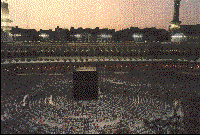|
|
Islam in History
 The spiritual centre of the Islamic world is the holy city of Makkah in western Saudi Arabia. In the 6th century A.D., Makkah was one of Arabia's thriving commercial centres, and it was destined to play the most important role in the birth of Islam. The spiritual centre of the Islamic world is the holy city of Makkah in western Saudi Arabia. In the 6th century A.D., Makkah was one of Arabia's thriving commercial centres, and it was destined to play the most important role in the birth of Islam.
Around the year 610, Muhammad, a native of Makkah, received a message from God (in Arabic, Allah) through the Angel Gabriel. As more revelations enjoined him to proclaim the oneness of God universally, the Prophet Muhammad's following grew. In 622, learning of an assassination plot against him, the Prophet led his followers to the town of Yathrib, which was later named Madinat Al-Nabi (City of the Prophet) now known simply as Madinah. This was the Hijrah, or migration, which marks the beginning of the Islamic calendar.
Within the next few years, several battles took place between the followers of the Prophet Muhammad and the pagans of Makkah. By 625, Madinah was entirely in the hands of the Muslims. The Prophet Muhammad unified the tribes so successfully that by 628 he and his followers re-entered Makkah without bloodshed.
Less than 100 years from the advent of Islam, the Islamic Empire extended from Spain to areas of India and China. Islam made no distinction based on race, class, or background, and the Muslim world was considered a single world-wide community, the ummah.
Islamic rule thrived well into the 17th century, and while Europe was passing through the Middle Ages, the Islamic civilisation made tremendous scientific, medical, literary and artistic advances which have had a lasting impact on the world.
|